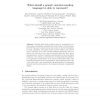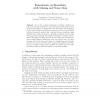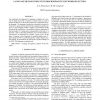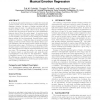1130 search results - page 122 / 226 » Emotion recognition using imperfect speech recognition |
ACII
2007
Springer
15 years 4 months ago
2007
Springer
Abstract. Working with emotion-related states in technological contexts requires a standard representation format. Based on that premise, the W3C Emotion Incubator group was create...
MCS
2004
Springer
15 years 3 months ago
2004
Springer
Abstract. One of the potential advantages of multiple classifier systems is an increased robustness to noise and other imperfections in data. Previous experiments on classificati...
ICASSP
2008
IEEE
15 years 4 months ago
2008
IEEE
One commonly used approach for language recognition is to convert the input speech into a sequence of tokens such as words or phones and then to use these token sequences to deter...
WWW
2005
ACM
15 years 10 months ago
2005
ACM
The Rich News system, that can automatically annotate radio and television news with the aid of resources retrieved from the World Wide Web, is described. Automatic speech recogni...
101
click to vote
MIR
2010
ACM
15 years 3 months ago
2010
ACM
In developing automated systems to recognize the emotional content of music, we are faced with a problem spanning two disparate domains: the space of human emotions and the acoust...




